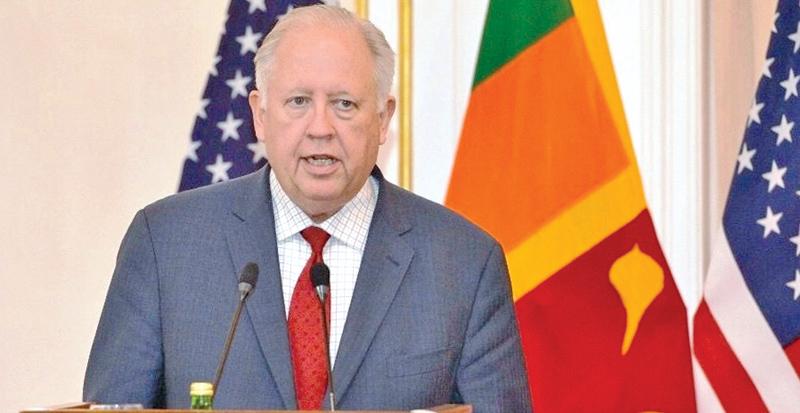
Earlier this week I visited Sri Lanka for the second time in my capacity as Under Secretary for Political Affairs at the United States Department of State. I was honoured to hold discussions with President Maithripala Sirisena, Prime Minister Ranil Wickremesinghe, Foreign Minister Tilak Marapana, and Finance Minister Managala Samaraweera, and lead the American delegation to the second United States-Sri Lanka Partnership Dialogue, hosted by the Ministry of Foreign Affairs. Our two nations have a growing partnership, and together, we can advance the cause of peace, security, and prosperity in the Indian Ocean region and the broader Indo-Pacific.
I commend Sri Lanka on its courageous decision to commit to a process of reform that will ensure greater happiness, prosperity, freedom and equality for all Sri Lankans, regardless of ethnicity or religion. For Sri Lanka, this opportunity to come together as a nation is crucial.
The United States fully supports those working to build a reconciled Sri Lanka, and commends the positive steps toward a new constitution and post-war justice, reconciliation and accountability.As the government makes progress in this area, our bilateral relationship will continue to grow.
I was pleased to inform the President and Prime Minister of three major U.S. government contributions to Sri Lanka. I shared the good news that the U.S. Peace Corps intends to return to Sri Lanka after an absence of nearly 20 years. American volunteers will return to Sri Lanka’s English classrooms. Additionally, I was gratified to inform them of a new 3.15 billion rupees ($21 million) project by the U.S. Department of Agriculture, through the Food for Progress program, that will increase the productivity of Sri Lanka’s dairy sector by improving milk quality, financing, and food safety. Finally, I am also pleased to announce that the United States will offer a U.S. Coast Guard cutter to the Sri Lankan Navy, pending Congressional approval. This vessel, a Secretary Class High Endurance Cutter, will enable Sri Lanka to more effectively police its coastline and Exclusive Economic Zone, and to protect its sea lines of communication.
These developments reflect our renewed American policy in this region. In August, President Donald Trump declared that the United States is “committed to pursuing our shared objectives for peace and security in South Asia and the broader Indo-Pacific region.” In a speech last month, Secretary of State Tillerson underlined the importance of the Indian Ocean, defining it as “the most consequential part of the globe in the 21st century.” Indeed, the Indian Ocean is the hub of global commerce, with nearly half of the world’s 90,000 commercial vessels and two-thirds of global oil trade traveling through its sea lanes. As such, it is incumbent upon all who call the Indian Ocean region home, and to other stakeholders here, to play a positive role in reinforcing stability, promoting democratic values, and fostering economic development.
While every part of the world is unique, the last century has shown that regions that build a fabric of interwoven institutions that collectively reinforce the global, rules-based order – whether focused on economics, security, international law, or academia – are more resilient in the face of challenges that inevitably arise.The Indian Ocean region possesses some of these institutions, and Sri Lanka itself is a member of a number of them. The United States and Sri Lanka, working with other regional partners, can enhance this regional architecture.
First, we should consider an Indian Ocean maritime information exchange to facilitate the sharing of regional maritime domain awareness data between participating nations. At the Indian Ocean Rim Association’s Council of Ministers last month, we publicly endorsed this concept, and we encourage Sri Lankan leadership on this initiative.
Next is the concept of a regional Coast Guard forum. Along with the maritime law enforcement agencies from five partner nations, the United States Coast Guard participates in the North Pacific Coast Guard Forum to discuss regional threats to stability and to exchange best practices on smuggling, maritime security, fisheries enforcement, and migration. We can replicate this architecture in the Indian Ocean.
A third concept is a regional code of conduct. An Indian Ocean regional code of conduct, or a collective declaration by the regional states, issued at this time - before the region is too highly pressured by outside interference to allow a successful conclusion - could help stave off the series of crises happening today just to your east in the South China Sea.
Such a declaration could clearly state that Indian Ocean nations are taking responsibilityfor their own backyard: it could affirm established international law and standards, including the freedoms of navigation and overflight and other lawful uses of the sea, and the primacy of dispute resolution through peaceful means.
Sri Lanka recently hosted an Indian Ocean Conference to advance a shared regional agenda and architecture for cooperation.
We wholeheartedly endorse Sri Lanka’s role as a convening country that can take the lead on Indo-Pacific issues. The United States will be with you every step of the way.
The author is Under Secretary for Political Affairs, the highest ranking career diplomat, at the United States Department of State.
